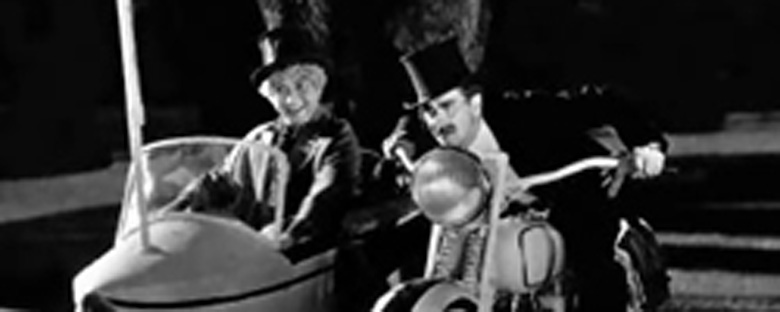Reviews
Leo McCarey
USA, 1933
Credits
Review by Matt Bailey
Posted on 19 November 2004
Source Universal DVD
Related articles
In his 1933 review of Duck Soup, Mordaunt Hall, the film reviewer for the New York Times, expressed surprise that the new Marx Brothers movie was a comedy “in which the bludgeon is employed more often than the gimlet.” For those less acquainted than Mr. Hall with bludgeons and gimlets, suffice it to say that the Marx Brothers’ eschewal of sophisticated wit in favor of sight gags, slapstick, and absurdist one-liners came as something of a disappointment to the reviewer. Judging by this one reaction, it might not seem so odd to note that the film was a spectacular flop upon its initial release. How strange it is, then, that we now see Duck Soup not as an anomaly in the Marx Brothers canon, but as the very yardstick against which all their films are measured. If a Marx Brothers movie does not feature Groucho frenziedly flipping puns and obscure references off his tongue, Harpo snipping the neckties off of stuffed shirts, Chico constructing a labyrinthine misunderstanding between himself and some poor sap, and Zeppo doing, well, whatever it is Zeppo does, we feel something is amiss.
The premise of Duck Soup has Groucho as the leader (named Rufus T. Firefly, a moniker to which I have given serious consideration changing mine legally) of the nation of Freedonia. Groucho being Groucho, he starts a war with a neighboring country. The Marx Brothers being the Marx Brothers, though, the war is little more than an excuse on which to hang a series of elaborate gags—some of the most famous of which are in this movie, most notably the scene in which Groucho toys with his reflection in what he thinks is a mirror but is actually a doorway with Harpo dressed as Groucho on the other side. Film history now shows that this gag was (I’ll put it politely) “borrowed” from earlier comedians, but a good gag well executed is a thing of beauty forever, no matter who originated it. The film’s humor might be broad and low, but sometimes a bludgeon is just funnier than a gimlet.
It would have been marvelous if the Marx Brothers had maintained the level of excellence they reached with Duck Soup for a few more pictures afterwards. After this film, however, they moved from Paramount to MGM, where their films were subject to more stringent generic constraints and thus experienced diminishing creative returns with each successive picture until they called it all off after 1946’s A Night in Casablanca. A run of twenty years is not such a bad thing, however, and Groucho went on to create what remains one of the funniest television shows ever in You Bet Your Life.
We don’t do comments anymore, but you may contact us here or find us on Twitter or Facebook.



